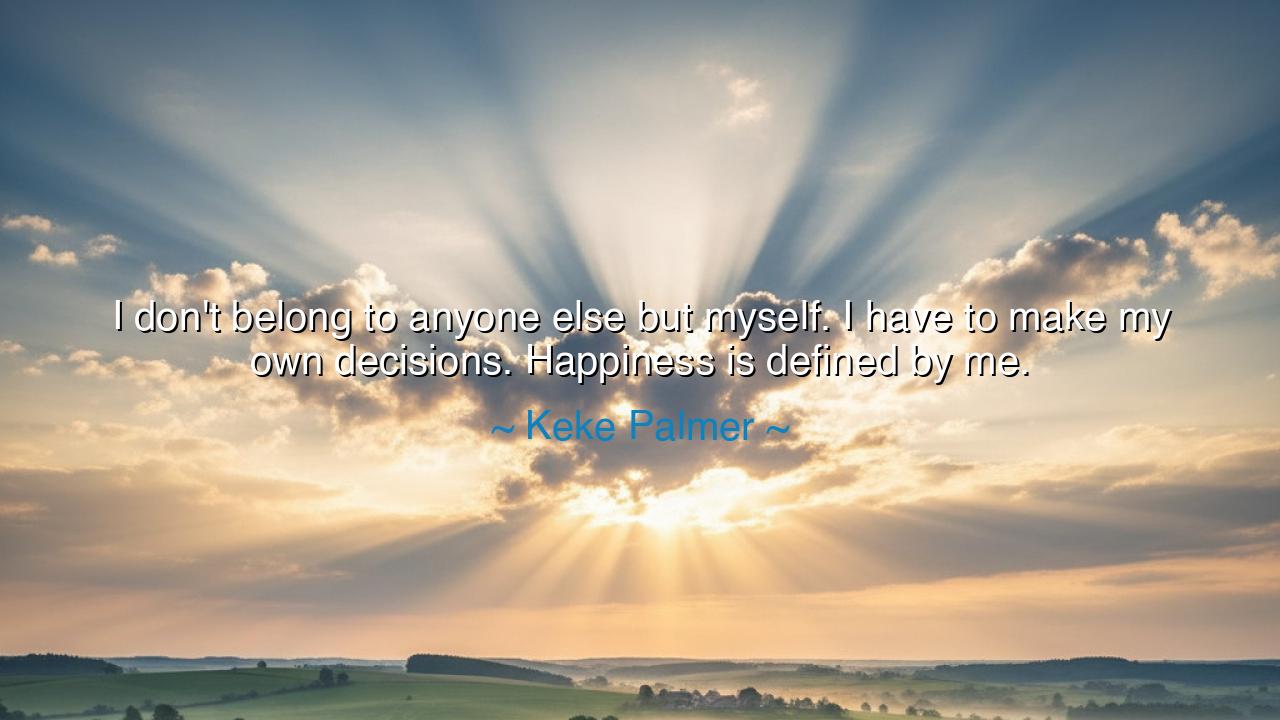
I don't belong to anyone else but myself. I have to make my own
I don't belong to anyone else but myself. I have to make my own decisions. Happiness is defined by me.






“I don’t belong to anyone else but myself. I have to make my own decisions. Happiness is defined by me.” Thus spoke Keke Palmer, a voice of her generation—an artist, actress, and woman of great inner strength. Her words, though modern in their form, echo the eternal cry of the human spirit: the yearning for freedom, the quest for self-sovereignty, and the sacred right to define one’s own happiness. In this age, where the world is loud with judgment and expectation, her declaration rises like a clear trumpet, calling each soul back to its rightful throne—the throne of self-ownership.
This quote was born from a lifetime of standing beneath the bright lights of fame, where the gaze of others becomes a cage. Keke Palmer, having entered the world of entertainment as a child, learned early the weight of other people’s opinions—the demands to conform, to please, to become a reflection of what others wanted her to be. In breaking from that, she reclaimed what many lose: the right to belong to oneself. Her words are not merely a declaration of independence; they are a reminder of responsibility—that true freedom means not escaping life’s pressures, but meeting them on one’s own terms.
The ancients, too, spoke of this sacred self-possession. The Stoic philosopher Epictetus taught that a man cannot be free until he governs his own mind, for slavery begins not in chains, but in dependence upon the approval of others. To belong to oneself, therefore, is to dwell in the citadel of the soul, where no hand can reach without permission. Keke Palmer’s wisdom flows from that same source—it is the understanding that autonomy is the root of dignity, and that happiness, to be real, must be chosen, not given. She reminds us that the soul cannot bloom in captivity; it must breathe its own air, grow in its own direction, and define its own sunlight.
Consider the story of Frida Kahlo, the artist whose life was marked by pain, betrayal, and confinement. Through physical suffering and emotional turmoil, she declared her own identity in defiance of every force that sought to define her. She said, “I paint myself because I am so often alone and because I am the subject I know best.” Like Palmer, she understood that belonging to oneself is not selfishness—it is self-realization. In her art, she turned anguish into beauty, limitation into freedom. She did not wait for happiness to be given; she defined it with her own colors, her own truth, her own hands.
To say “I have to make my own decisions” is to accept the sacred burden of choice. Freedom without decision is only illusion. Many desire independence, but few accept its cost—the weight of accountability. Keke Palmer’s words carry that maturity. To rule oneself is to be both the sovereign and the servant of one’s own destiny. It means to trust one’s inner wisdom even when the world mocks or misunderstands it. For the voice within, though quiet, speaks a language older than time—it is the whisper of the soul remembering who it was before the world told it who to be.
And when she says, “Happiness is defined by me,” she teaches that joy is not a treasure to be found in the opinions of others, nor a prize to be earned by compliance. It is an act of creation. Each life must sculpt its own meaning, just as the sculptor carves form from formless stone. Happiness cannot be inherited or prescribed; it must be discovered through alignment between who we are and how we live. The wise do not chase joy—they build it, decision by decision, truth by truth, until their life becomes a reflection of their deepest self.
The lesson, then, is both simple and profound: do not surrender your life’s compass to another’s hand. Do not wait for permission to be yourself. The world will try to name you, shape you, and bind you—but your duty is to return to your own center, again and again, until you are whole. To belong to yourself is not rebellion against others—it is fidelity to the divine within you. Define your happiness, not by comparison, but by authenticity; make your decisions, not by fear, but by faith in your own path.
So, to those who hear Keke Palmer’s words, take them not as mere sentiment but as a vow. Stand before the mirror of your life and say, “I belong to myself.” Choose with courage, live with integrity, and define your joy with the ink of your own spirit. For the greatest tragedy is not rejection by others, but abandonment of oneself. And the greatest triumph is not fame, nor wealth, nor approval—but to wake each morning free in mind, steadfast in purpose, and content in the truth that your life, in all its imperfection, belongs wholly to you.






AAdministratorAdministrator
Welcome, honored guests. Please leave a comment, we will respond soon